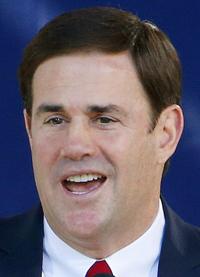PHOENIX — Saying the number of presidential contenders likely means no early decision on a nominee, Gov. Doug Ducey won’t use his power to move next year’s presidential primary from March 22.
In an interview with Capitol Media Services, Ducey acknowledged that in many prior years the votes for presidential contenders that already have taken place elsewhere in other states by mid-March have pretty much meant “game over” by the time Arizonans go to the polls.
“Traditionally, by March 1 things have been decided,” Ducey said. But he said that, with the current crowded GOP field, it looks like that won’t happen in 2016.
“Maybe we are in the sweet spot on March 22 where we’ll be a deciding state or certainly getting more attention,” he said.
This isn’t just an academic question for the governor.
A law approved last year sets the Arizona primary at the first Tuesday after March 15. For 2016 that means March 22.
That same law, however, lets the governor unilaterally move the date even later. And in prior years Arizona lawmakers have used their own authority — with gubernatorial permission — to move around the date for political reasons.
But Ducey told Capitol Media Services that’s not going to happen under his watch. In fact, he quite likes the date and what he believes will be the focus on Arizona by the candidates and the media.
“There’s a whole bunch of primaries on March 1 in terms of Super Tuesday,” the governor said, with voters in 13 states deciding through primaries or caucuses on that date who they support for each party’s nominee.
“We’re alone on March 22,” Ducey said, being the only state on that date where voters will go to the polls. The only competition for the national political spotlight that day will be in Utah, which has party caucuses.
“Arizona may get some attention on this,” the governor said.
Ducey said some individuals — he did not name names — argued for an earlier primary with the thought that would have Arizona play a more significant role in narrowing the huge field of candidates in the Republican Party. And he acknowledged there is a history of doing that since Arizona decided to give voters here a direct say.
Up through 1992, Arizona Democrats and Republicans each held a caucus in the spring of presidential election years to select delegates to their party conventions. That changed with a 1993 vote to have the state run a presidential preference primary on the second Tuesday in March in 1996.
It didn’t take long for lawmakers to tinker with the plan.
Even before that first primary, then-Gov. Fife Symington and Sen. John McCain pushed through a measure to move the date up to the end of February in hopes of helping Republican Phil Gramm in his presidential bid. That, however, did Gramm no good, with his campaign effectively dead before Arizona even got to vote.
Then in 1999, with McCain running for president himself, his campaign aides moved to push the 2000 election back to March.
The reason? The February date would have put Arizona just behind New Hampshire but ahead of California, Florida, Pennsylvania and New York on the primary calendar.
More to the point, George W. Bush was polling ahead of the state’s favorite son. And a loss in his home state would have crippled McCain’s candidacy, possibly fatally.
As it turned out, the election remained in February and McCain did carry his home state, only to lose the nomination to Bush.
Efforts continue to figure out the perfect date for Arizonans to go to the polls.
Two years ago, Rep. Phil Lovas, R-Peoria, tried to set the date for the Arizona primary on the same day as the Iowa political caucus.
Lovas pointed out that the Republican Party started off the race in 2012 with nine contenders in Iowa’s caucus.
By the time of Arizona’s primary — Feb. 28 that year — he said not only had Iowa weighed in but so had voters in New Hampshire, South Carolina, Florida, Nevada, Colorado, Minnesota, Missouri and Maine. And the field had been pared to just four.
“Quite frankly, for 40-plus years Iowa and New Hampshire have helped essentially determine who is or who is not the nominee for both parties,” Lovas argued at the time. “And I feel as though Arizona voters are being disenfranchised.”
His measure failed. In fact, lawmakers last year moved in the opposite direction, adopting the current version of the law with a March primary and that option for the governor to move the date even later.




